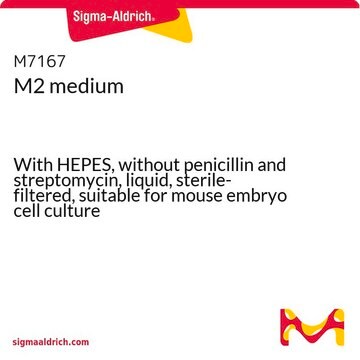MR-121
EmbryoMax® KSOM Mouse Embryo Media
(1X), Liquid, with 1/2 Amino Acids & Phenol Red
Sinónimos:
K+ Simplex Optimised Medium (KSOM), KSOM Media
About This Item
Productos recomendados
Nivel de calidad
formulario
liquid
fabricante / nombre comercial
Specialty Media
EmbryoMax®
técnicas
cell culture | embryo: suitable
cell culture | stem cell: suitable
entrada
sample type: mouse embryo(s)
Aplicación
Almacenamiento y estabilidad
Once thawed it should be used within 2 weeks.
Note: Our EmbryoMax Liquid Mouse Embryo Media is produced on a bi-monthly basis. For regular users, we encourage standing orders to ensure that backorders do not occur.
Información legal
Cláusula de descargo de responsabilidad
Código de clase de almacenamiento
12 - Non Combustible Liquids
Clase de riesgo para el agua (WGK)
WGK 2
Punto de inflamabilidad (°F)
Not applicable
Punto de inflamabilidad (°C)
Not applicable
Certificados de análisis (COA)
Busque Certificados de análisis (COA) introduciendo el número de lote del producto. Los números de lote se encuentran en la etiqueta del producto después de las palabras «Lot» o «Batch»
¿Ya tiene este producto?
Encuentre la documentación para los productos que ha comprado recientemente en la Biblioteca de documentos.
Los clientes también vieron
Artículos
Advanced KSOM mouse embryo media that can be used as a single medium for both harvest and culture of mouse embryos to facilitate creation of transgenic knockout mice.
Mouse embryo media and embryo validated reagents for transgenic mouse embryo culture
Nuestro equipo de científicos tiene experiencia en todas las áreas de investigación: Ciencias de la vida, Ciencia de los materiales, Síntesis química, Cromatografía, Analítica y muchas otras.
Póngase en contacto con el Servicio técnico





